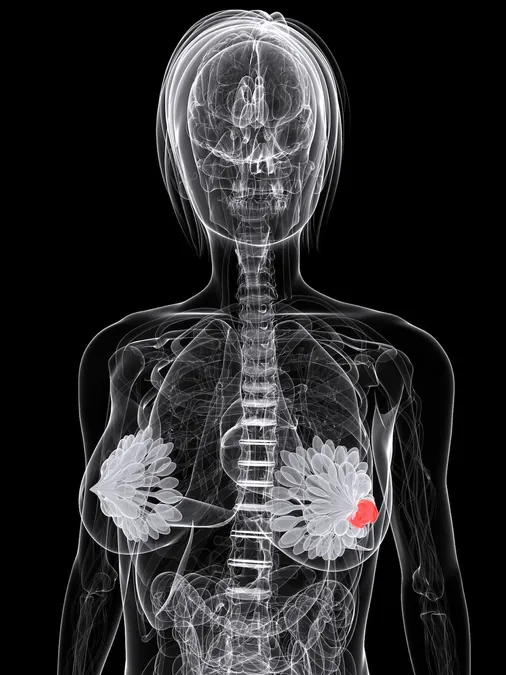
Groundbreaking Study Reveals New Hope for Triple-Negative Breast Cancer Patients!
2025-01-03
Author: Wei
Recent Findings from Cleveland Clinic
Recent real-world data from the Cleveland Clinic suggests that combining pembrolizumab (known as Keytruda) with chemotherapy could significantly enhance treatment outcomes for patients battling early-stage triple-negative breast cancer (TNBC). This follows findings from the pivotal phase 3 KEYNOTE-522 trial, which involved a neoadjuvant treatment regimen of pembrolizumab alongside chemotherapy drugs such as carboplatin, paclitaxel (Taxol), doxorubicin, epirubicin, and cyclophosphamide.
Study Overview and Results
In a study published in the Annals of Surgical Oncology, researchers tracked the outcomes of 240 patients diagnosed with stage II or III TNBC who underwent this innovative treatment. Among the 240 participants, 86 patients received the KEYNOTE-522 combination therapy, while 154 were treated with a conventional chemotherapy regimen. The results were staggering: patients treated with the KEYNOTE-522 regimen achieved a pathologic complete response (pCR) rate of 59.3%, compared to just 33.1% in the control group. This translates to a significant odds ratio of .34, underscoring the regimen's effectiveness (P = .0001).
Surgical Implications
Moreover, the study showed that patients receiving the KEYNOTE-522 treatment experienced notably fewer axillary node dissections (ALND), suggesting that the regimen not only improves survival rates but may also lead to less invasive surgical procedures — 25.6% in the KEYNOTE-522 group compared to 39.6% in the control group (P = .03).
Expert Opinions
Dr. Julie Lang, a leading figure in breast cancer research and part of the study team, expressed her optimism about these findings: 'We suddenly have a regimen that’s highly effective, and we hope other hospitals will adopt this new approach to improve their treatment plans for TNBC patients.'
Patient Demographics and Outcomes
The patient demographic in this study revealed critical insights: the median age was 56 years, with a predominant proportion (66%) having T2 tumors. Another noteworthy statistic showed that 83% of patients had high-grade tumors, underscoring the aggressive nature of the disease in this cohort.
Survival Outcomes and BRCA1 Mutation Impact
It is essential to note that while the study highlighted significant improvements in treatment effectiveness and a favorable pCR outcome, it also indicated no differences in survival outcomes with a median follow-up of 2.4 years across treatment groups. A silver lining, however, emerged for patients with BRCA1 mutations, who exhibited even higher pCR rates — 80% in the KEYNOTE-522 group and 75% in the control.
Safety and Adverse Events
In terms of safety, 34.9% of participants experienced immune-related adverse events (irAEs), with endocrine disorders making up a significant portion (48%) of these complications, a rate higher than seen in the original KEYNOTE-522 trial.
Conclusion and Future Directions
As these promising findings circulate through the medical community, the focus now shifts to wider adoption of the KEYNOTE-522 regimen, potentially revolutionizing treatment strategies for TNBC. Could this be the breakthrough that changes the landscape of breast cancer treatment forever? Scientists and patients alike are hopeful, as the journey towards finding a cure continues.



 Brasil (PT)
Brasil (PT)
 Canada (EN)
Canada (EN)
 Chile (ES)
Chile (ES)
 Česko (CS)
Česko (CS)
 대한민국 (KO)
대한민국 (KO)
 España (ES)
España (ES)
 France (FR)
France (FR)
 Hong Kong (EN)
Hong Kong (EN)
 Italia (IT)
Italia (IT)
 日本 (JA)
日本 (JA)
 Magyarország (HU)
Magyarország (HU)
 Norge (NO)
Norge (NO)
 Polska (PL)
Polska (PL)
 Schweiz (DE)
Schweiz (DE)
 Singapore (EN)
Singapore (EN)
 Sverige (SV)
Sverige (SV)
 Suomi (FI)
Suomi (FI)
 Türkiye (TR)
Türkiye (TR)
 الإمارات العربية المتحدة (AR)
الإمارات العربية المتحدة (AR)